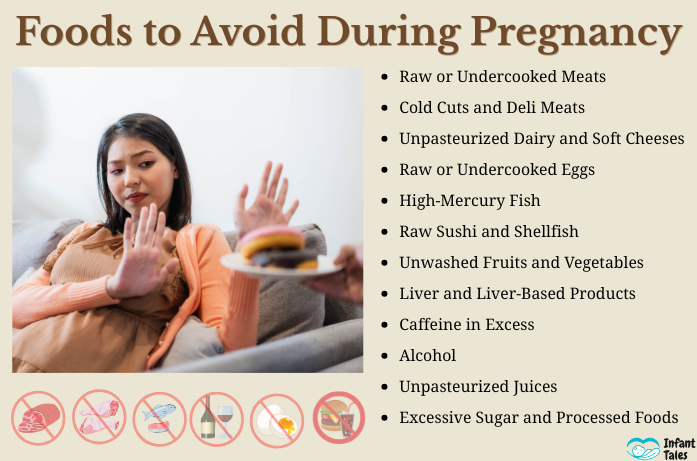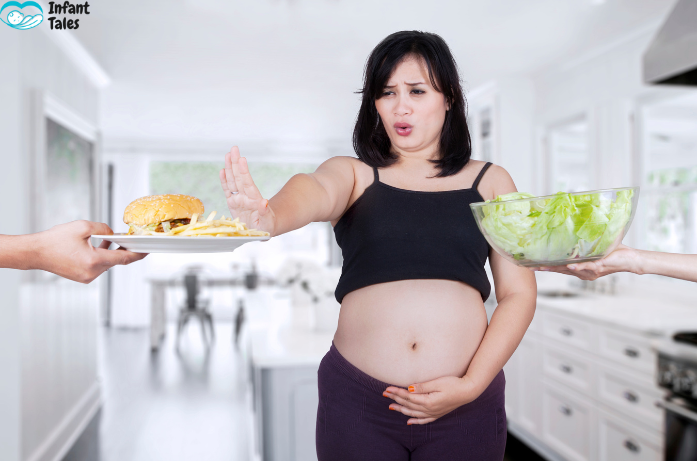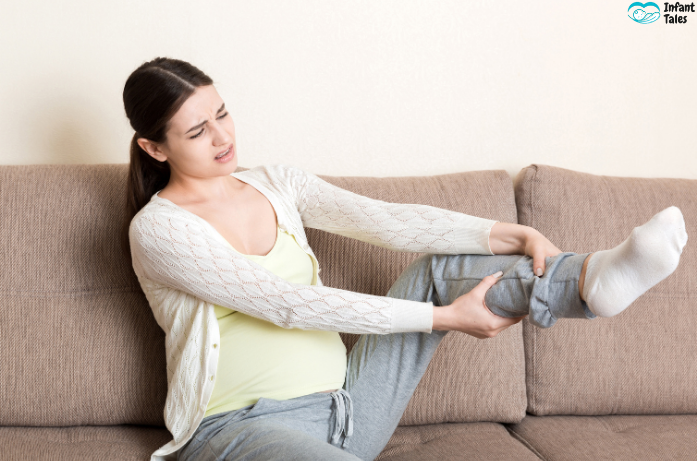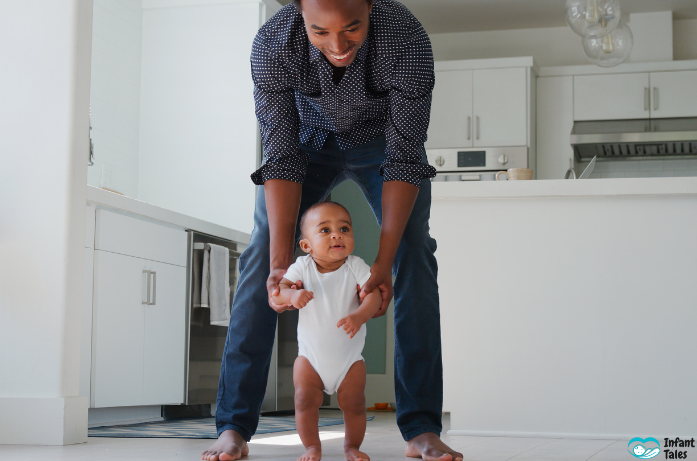By a Caring Mom at Infant Pamper
Pregnancy isn’t just a physical change; it’s a journey that transforms the lives of those involved. It can be filled with excitement, curiosity, and sometimes a little anxiety, especially regarding dietary aspects. A pregnant woman’s diet isn’t just about the nutrition her body receives, but also about ensuring her baby gets the healthiest possible start with a healthy pregnancy diet and safe eating habits.
You’ve likely heard about the importance of consuming plenty of nutrients during pregnancy, but it’s equally important to know which foods to avoid during pregnancy and understand what not to eat during pregnancy. While some foods may be considered safe for others, unfortunately, they can lead to miscarriage, developmental problems, or worse, birth defects when consumed by pregnant women.
This guide will help you to identify the most significant foods to avoid during pregnancy, tell you the reasons for their risks, and present to you some safe foods during pregnancy that benefit both your health and your baby’s development.
Why Food Safety Matters So Much in Pregnancy
During pregnancy, your immune system shifts to support the baby’s growth, which makes you more vulnerable to foodborne illnesses. Infections like Listeria, Toxoplasma, or Salmonella may not make a healthy person very sick, but they can pose serious threats to you and your unborn baby.
The period of caution doesn’t mean that you should live in fear, but it definitely means that you should make smart and informed choices about what to eat.

1. Raw or Undercooked Meats
Don’t eat rare steak, undercooked burgers, or pink lamb. They might harbour dangerous bacteria such as E. coli, Toxoplasma, or Salmonella, which are responsible for serious food poisoning during pregnancy and thus, in turn, lead to miscarriage or other complications.
What to do instead:
Always prepare meat completely through, no pink or red colour in the middle. Use a thermometer to ensure that the meat reaches at least 160°F (71°C) internally for proper pregnancy food safety.
2. Cold Cuts and Deli Meats
Prepackaged meats like ham, turkey slices, salami, or hot dogs might seem to be a good choice after all, but most of the time, these kinds of meats carry Listeria, a bacterium which not only survives in chilly places but also is known to be the causative agent of miscarriages or stillbirths.
Pregnancy-safe option:
Deli meats should be heated until they are piping hot and then eaten. This process will wipe out any stealthy bacteria and thus is safer for both you and your child.
3. Unpasteurized Dairy and Soft Cheeses
Dairy is a must for calcium and protein but nevertheless, it is advisable to stay away from soft cheeses such as Feta, Brie, Camembert, blue cheese, and queso fresco unless they come with a “pasteurized” label.
Unpasteurized dairy products may harbour Listeria, which poses a risk in pregnancy and can cause serious infections in babies.
Better choices:
- Hard cheeses like cheddar or Swiss
- Pasteurized yogurt and milk
- Ricotta and cottage cheese (check labels)
4. Raw or Undercooked Eggs
Eggs, dressing, or dough may contain Salmonella, which can cause vomiting, dehydration, and in very rare cases, preterm labour.
What to do instead:
- Pasteurized eggs can be used
- Cook eggs until both yolks and whites are firm
- Avoid raw egg-containing foods unless labelled safe
5. High-Mercury Fish
Fish is excellent for brain development of your baby, but some kinds are dangerously high in mercury that consequently can affect the nervous system of your kid.
According to the Mayo Clinic, pregnant women should avoid high-mercury fish such as Shark, Swordfish, King Mackerel, and Tilefish.
Safe options to include in your pregnancy meal plan: Salmon, Shrimp, Sardines, Trout
Limit to 2–3 servings per week.
6. Raw Sushi and Shellfish
Raw seafood, which includes sushi, oysters, or clams, can introduce you to harmful bacteria and parasites that cause food poisoning.
Safer alternatives:
- Sushi that is made of cooked fish (like shrimp tempura)
- Vegetarian sushi rolls with avocado, cucumber, or sweet potato
These choices maintain pregnancy food safety while satisfying cravings.
7. Unwashed Fruits and Vegetables
The case of dirt and residues carrying Toxoplasma or pesticide residue that can cause harm during pregnancy even extends to fresh produce which can be risky if not properly washed.
Simple prevention:
- Clean all vegetables and fruits under running water that is safe and clean
- Hard-shelled items should be scrubbed with a brush
- Prefer fruits that are peeled if possible
8. Liver and Liver-Based Products
Although liver is a very nutritious organ, the liver has extremely high levels of vitamin A which can cause birth defects especially during the first trimester in excess of the daily requirement.
Safer sources of vitamin A: Carrots, Sweet potatoes, Dark leafy greens like spinach
9. Caffeine in Excess
Excessive caffeine consumption during pregnancy is associated with a greater probability of miscarriage, besides which babies of such pregnancies may be born with low weight and even face sleep problems later on.
According to the March of Dimes, keeping your caffeine approximately 200 mg of caffeine intake per day is safe, which equals roughly one 12-ounce cup of coffee.
Watch for hidden sources: Energy drinks, Soda, Chocolate, Certain teas and medications
10. Alcohol
One of the most important pregnancy rules is to avoid alcohol entirely. No amount is declared to be safe. Consumption of alcohol during pregnancy maybe the cause of certain disorders in relation to the alcohol spectrum namely Fetal Alcohol Spectrum Disorders (FASD) which can affect the development of the baby’s brain and body.
Try instead:
- Sparkling water with lemon or fruit
- Mocktails
- Herbal teas (doctor-approved)
11. Unpasteurized Juices
Unpasteurized fruit juices, especially those that are fresh and being sold at local stalls may harbour bacteria like E. coli and Salmonella which can cause infections.
What to do:
Always pick pasteurized juice, or make your own at home with fruits and vegetables that have been thoroughly washed produce to ensure pregnancy food safety.
12. Excessive Sugar and Processed Foods
Packaged snacks, soft drinks, confections, and fried foods are all heavily laden with sugar, salt, and trans fats. These can heighten the chances of getting gestational diabetes, gaining unhealthy weight, and having complications in childbirth.
Healthier snack ideas:
- Fresh fruit
- Whole grain crackers with nut butter
- Plain yogurt with berries
- Boiled eggs or trail mix
Extra Tips for Safe Eating in Pregnancy
- Read food labels carefully for safety details like “pasteurized” or “fully cooked.”
- Stay away from roadside food or open buffets where there is a possibility that the food has been sitting out too long.
- Store leftovers properly and reheat to steaming temperature.
- Drink plenty of water and avoid overly sugary or caffeinated beverages.
- Trust your body, if something smells off or you’re unsure, skip it.
Final Thoughts
Eating during pregnancy shouldn’t be stressful or complicated. Its about paying attention to what goes into your body and by choosing safe, nutritious foods, you are creating a healthy, nourishing environment for your baby’s growth and development.
The list of foods to avoid during pregnancy may seem long, but once you understand the risks and safe alternatives, making the right choices becomes natural. Remember, it’s not about perfection; it’s about progress, awareness, and care.
FAQs
1. What foods should I avoid during pregnancy?
You should stay away from raw or undercooked meat, high-mercury fish, unpasteurized dairy, raw eggs, and deli meats unless they are properly heated. These foods might be the source of bacteria or toxins that can harm your baby.
2. Is coffee safe during pregnancy?
Yes, in moderation. Limit your caffeine intake to 200 mg per day (which is approximately the same as one cup of regular coffee) to reduce risks of low birth weight or sleep issues.
3. Can I eat cheese while pregnant?
Yes, but only if it’s made from pasteurized milk. Avoid soft unpasteurized cheeses like Brie, Feta, or blue cheese, which can contain Listeria.
4. Can pregnant women eat fish?
Yes, however, fish low in mercury such as salmon, shrimp, and sardines should be your choice. Shark, swordfish, and king mackerel are the ones to be avoided as they are high in mercury levels.
5. Can I drink alcohol during pregnancy?
No, alcohol should be completely avoided during pregnancy as it can lead to Fetal Alcohol Spectrum Disorders (FASD) and affect your baby’s brain development.
Motherhood is beautiful, and we’re here to guide you through every step. Subscribe to Infant Tales to receive gentle advice on pregnancy, baby care, and self-care for moms.
Disclaimer: This article is intended for informational purposes only and is not a substitute for medical advice. Please consult your doctor or prenatal care provider regarding your individual dietary needs during pregnancy.



